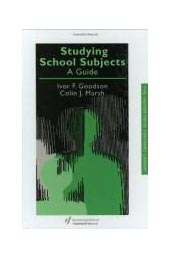Studying School Subjects: a guide
Conclusions, Complexities and Conjectures
The judgement quoted by Carson that the Schools Council sub-committees 'jealously guarded the preserves of their subject' was confirmed by the comments from the geography sub-committee when the decision on the 'A' level was finally announced. They were plainly fairly satisfied with their territorial defence and 'noted with approval that candidates could not take this examination together with geography'. A final point was added that there was 'as yet no indication that universities would be prepared to accept a pass in this subject as an entry qualification for degree courses'. The restriction on environmental studies being offered with geography, together with the initial restriction to a five-year period and to only the Standing Panel schools, placed enormous practical obstacles in the way of any widespread adoption of the subject. By ensuring these obstacles faced the new subject in the early years when the momentum for change was strong, the opponents to the new subject effectively extinguished the chances of its establishment in the school curriculum.
The book provides evidence of three subject communities in evolution and in conflict. It shows a range of conflicting sub-groups within the subjects and that these often concentrated around the three major 'traditions' discerned. The pursuit of material self-interest ultimately ensured that the sub-groups attached to the academic tradition came to dominate the subjects. This was because the flow of resources, finance and recognition of 'departmental' territory and needs has been linked especially to 'scholarly disciplines' that can be taught to 'able' students. We have seen how the promotion of a subject as a scholarly discipline was systematically co-ordinated by subject associations and by groups of university scholars. Once the academic base of the scholarly discipline was established within the universities the dominance of the academic tradition within the subject was firmly wedded to the vested interests of the university scholars
The university departments then played a major role in defining the subject (though often with significant time-lags) through their control of the training of the school teachers of the subjects; through their role in the major influential committees, such as the Schools Council Subject Subcommittees, and within examination boards; and through their role in decisions about which 'A' levels are acceptable qualifications for their degree courses. The subject communities and associations representing the school teachers accepted, indeed at points conspired to produce, this dominant university role because the teacher's career was so crucially dependent on the flow of resources linked to the subject's continuing status as a scholarly discipline for '0' and 'A' level students.
